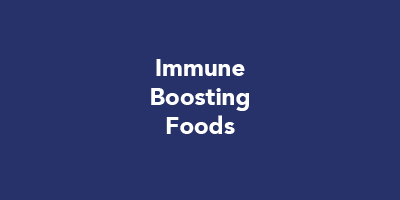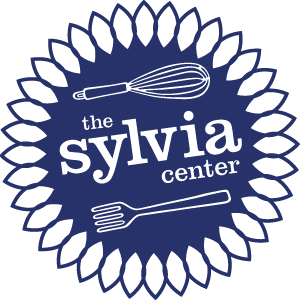
Immune Boosting Foods
by Yvonne Mei
We are constantly being exposed to potentially harmful germs on a daily basis. How do we protect ourselves from these harmful germs? With the immune system! The immune system is our body’s way of protecting us from outside invaders. These include germs such as bacteria, viruses, fungi, parasites, and toxins (chemicals made by microbes).(1) If left alone, these germs can cause damage in the body that lead to the development of certain disease conditions. Therefore, it is important that we keep our immune system healthy and happy!
There are many ways to support a healthy immune system. This includes maintaining a healthy weight, good mental health, and adequate sleep and rest.(2) Diet is also a contributing factor.
A poor diet high in refined carbohydrates, added sugars, saturated fat, and red meat and low in fruits and vegetables can interfere with the function of protective immune cells, promote inflammation, and alter immune response.(2,3) Furthermore, it can cause deficiencies in vitamins and minerals that are important in immune function.(2)
Eating a balanced diet with whole fruits, vegetables, lean proteins, whole grains, and plenty of water will support immune system function. Here are some foods that will help boost your immune system!
| Iron | Iron is an essential component in immune cell development and function.(4,5) It helps fight infections about enabling immune cells to develop and fight bacterial infections.(5) Iron is also used by red blood cells to carry oxygen to the rest of the body.
Lentils are an excellent source of iron. One cup of cooked lentils provides 6.6 mg of iron, which is equivalent to 37% of recommended daily intake. Other sources include beans, nuts, and fortified breakfast cereals. |
|
Vitamin A |
Vitamin A regulates immune cells and keeps skin and tissues in the mouth, stomach, intestines and respiratory system healthy.(4,5,6) It is also necessary for eye health and normal vision and critical for healthy heart, lung, and kidney functions.
Sweet potatoes are an excellent source of vitamin A. A baked sweet potato in its skin provides around 1,403 mcg of vitamin A, equivalent to 561% of the recommended daily intake. Other sources include orange and red fruits and vegetables. |
| Vitamin C | Vitamin C stimulates the formation of antibodies, and the production, function and movement of white blood cells.(4,5,6) It also acts as an antioxidant, preventing cells from free radical damage.
One medium-sized red bell pepper provides 152 mg of vitamin C, equivalent to 169% of the recommended daily intake. Other sources include citrus fruits like oranges, grapefruit, strawberries and tomatoes. |
| Vitamin D | Vitamin D is an important part of many cells in the body, including disease fighting immune cells. It is also important for promoting healthy strong bones as it helps the body absorb calcium.(4,6)
One cup of fortified milk provides 3mcg of vitamin D, or 20% of the recommended daily intake. Vitamin D can also be made in our bodies when our skin is exposed to sunlight. Other sources include salmon, egg yolks, fortified juice and fortified dairy. |
| Vitamin E | Vitamin E is an antioxidant that protects the cell membranes from free radical damage.(4,6) It also regulates the development and functions of some immune cells.(5)
Sunflower seeds are a great source of vitamin E. One ounce provides 7.4mg or 50% of recommended daily intake. Other sources include seeds, nuts, vegetables oils and peanut butter. |
| Zinc | Zinc is essential for immune to the growth and development of immune cells in the body.(5) It also plays a role in wound healing by maintaining skin strength.(6)
One cup of oatmeal provides 2mg of zinc, which is equivalent to 21% of the recommended daily intake. Other sources include whole grains, milk, seeds and nuts. |
| Selenium | Selenium also acts as a powerful antioxidant which helps fight free radicals in the body and boosts immunity.
Around one cup of cooked brown rice provides 19mcg, or 35%, of the recommended daily intake. Other sources of selenium include tuna, turkey, chicken, eggs, whole wheat bread, baked beans. |
References
- Johns Hopkins Medicine. (n.d.). The immune system. Johns Hopkins Medicine. Retrieved April 5, 2022, from https://www.hopkinsmedicine.org/health/conditions-and-diseases/the-immune-system#:~:text=What%20is%20the%20immune%20system,and%20proteins%20that%20work%20together
- The Nutrition Source. (2021, January 27). Nutrition and immunity. Harvard T.H. Chan School of Public Health. Retrieved April 5, 2022, from https://www.hsph.harvard.edu/nutritionsource/nutrition-and-immunity/
- Kubala, J., & Beake, J. (n.d.). Diet and the immune system: What is the link? Medical News Today. Retrieved April 5, 2022, from https://www.medicalnewstoday.com/articles/how-and-why-does-diet-influence-immune-function#Adverse-effects-of-unhealthy-diets
- Pronschinske, J. (2021, November 16). Nutrition and immune function. Mayo Clinic Health System. Retrieved April 5, 2022, from https://www.mayoclinichealthsystem.org/hometown-health/speaking-of-health/support-your-immune-function-with-good-nutrition
- Iddir, M., Brito, A., Dingeo, G., Fernandez Del Campo, S. S., Samouda, H., La Frano, M. R., & Bohn, T. (2020). Strengthening the immune system and reducing inflammation and oxidative stress through diet and nutrition: Considerations during the COVID-19 crisis. Nutrients, 12(6), 1562. https://doi.org/10.3390/nu12061562
- Streit, L., & Andersson, M. (2021). The Complete Guide to natural vitamins: What to eat to support your health and immune system. New Burlington Books.


